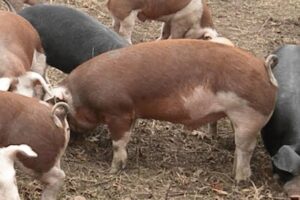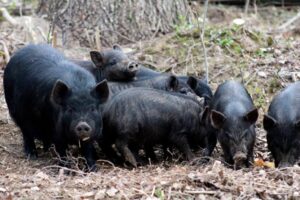Berkshire pigs, known for their exceptional meat quality, are a popular breed choice among farmers looking for premium pork production. With a rich history and distinct characteristics, Berkshires are renowned for their tender, well-marbled meat and their easy-going temperament. Whether you are a beginner or an experienced farmer, Berkshire pigs are an excellent addition to any farm.
Read about Yorkshire Pigs
In this article, we’ll explore the history, characteristics, benefits, and tips for raising Berkshire pigs, ensuring you have all the knowledge you need to succeed in raising this prestigious breed.
History of Berkshire Pigs
Berkshire pigs are one of the oldest pig breeds, originating in the Berkshire region of England over 300 years ago. The breed was developed to produce high-quality pork, with a strong emphasis on marbling and tenderness. Berkshires were favored by English royalty and soon gained popularity for their flavorful meat, making their way to the United States in the early 1800s.
In modern times, Berkshire pigs remain one of the most prized breeds for pork production, particularly in the premium pork market. Their meat is often marketed as Kurobuta pork, which is highly sought after in upscale restaurants and specialty markets.
Physical Characteristics of Berkshire Pigs
Berkshire pigs are easily recognizable due to their distinct physical features:
Color: They have a black body with white markings on their legs, face, and tail.
Size: Berkshires are medium to large pigs. Boars can weigh between 600 and 800 pounds, while sows typically weigh between 450 and 600 pounds.
Body Shape: Berkshires have a well-rounded, muscular build with a broad back and strong legs, making them ideal for meat production.
Ears: Their ears are erect, giving them an alert and sturdy appearance.
Key Benefits of Raising Berkshire Pigs
Berkshire pigs offer several advantages for farmers, whether you’re running a large-scale pork production facility or a small homestead. Here are the top reasons why Berkshires are a great choice:
- Superior Meat Quality
The most significant benefit of Berkshire pigs is their outstanding meat quality. Known for producing tender, juicy pork with excellent marbling, Berkshire pork is often compared to high-quality beef steaks in terms of flavor and texture. This breed consistently produces pork that is rich in flavor, making it a favorite for chefs and consumers looking for premium cuts.
The marbling of the meat not only enhances the flavor but also contributes to its tenderness, making Berkshire pork highly marketable in both local and gourmet markets.
- Efficient Growth Rate
Berkshire pigs grow efficiently, reaching market weight relatively quickly when fed a balanced diet. Their fast growth rate makes them a profitable breed for farmers, as they can reach market readiness in around 6 to 7 months. While they may not grow as fast as some commercial breeds, their superior meat quality more than compensates for the slightly longer growth period.
- Adaptability to Different Environments
Berkshire pigs are highly adaptable and thrive in various environments, from confined housing to pasture-based systems. Whether you raise pigs in an indoor barn or allow them to roam in outdoor paddocks, Berkshires will adjust well to their surroundings. This versatility makes them a suitable breed for a wide range of farming operations.
- Docile Temperament
One of the reasons why Berkshire pigs are favored by both beginner and experienced farmers is their calm and docile temperament. Berkshires are generally easy to handle and less aggressive than some other breeds, making them suitable for farmers with little experience in raising pigs. Their friendly nature also makes them a good choice for small farms or homesteads.
- Good Mothering Ability
Berkshire sows are known for their excellent mothering instincts. They typically have smaller but healthy litters and take great care of their piglets. Their nurturing nature reduces the need for constant supervision during farrowing, which is especially helpful for farmers with busy schedules.
Challenges of Raising Berkshire Pigs
While Berkshire pigs offer numerous benefits, there are a few challenges to be aware of:
- Higher Feed Costs
Berkshire pigs have a slightly higher feed-to-weight conversion ratio compared to some other commercial breeds, meaning they may require more feed to reach market weight. However, the premium price that Berkshire pork can command often offsets these additional feed costs.
- Sensitive to Weather Conditions
Berkshire pigs, like most pigs with lighter skin, can be sensitive to extreme weather conditions, particularly hot climates. Farmers raising Berkshires in hot environments should provide adequate shade and access to water to prevent heat stress.
Tips for Raising Berkshire Pigs
Here are some essential tips to ensure success when raising Berkshire pigs:
- Provide a Balanced Diet
To optimize growth and meat quality, it’s essential to feed Berkshire pigs a balanced diet rich in protein, vitamins, and minerals. Quality feed not only promotes healthy weight gain but also enhances the marbling and flavor of the meat.
- Offer Adequate Space
While Berkshires are adaptable, they require enough space to move around comfortably. Ensure that housing is spacious, well-ventilated, and clean to promote good health and reduce the risk of disease.
- Ensure Regular Veterinary Care
Like all livestock, Berkshires require regular veterinary checkups and vaccinations to prevent common diseases. A good health management plan, including routine deworming and vaccinations, will keep your pigs healthy and growing steadily.
- Provide Proper Farrowing Care
If breeding Berkshire pigs, it’s important to ensure that sows have a clean, comfortable space to give birth and care for their piglets. Ensure sows receive proper nutrition during pregnancy and monitor them during farrowing to ensure healthy piglets.
Conclusion
Berkshire pigs are an excellent choice for farmers seeking a breed that delivers premium meat quality, efficient growth, and adaptability. Their superior pork, calm temperament, and adaptability make them one of the top breeds for both small-scale farmers and large commercial operations. While they may require slightly higher feed costs, the payoff comes in the form of high-quality pork that fetches premium prices in the market.
By following best practices in feeding, housing, and healthcare, you can raise healthy Berkshire pigs that will contribute to your farm’s success. Whether you’re looking to produce gourmet pork or expand your farming operation, Berkshires are a breed that can offer high returns on investment.







1 Comment
Comments are closed.